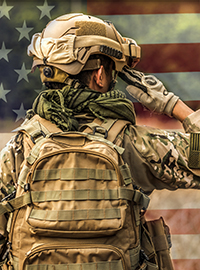| Confidence in U.S. Military Falls from 70% to 48% Since 2018 |
 |
|
By Timothy H. Lee
Thursday, December 08 2022 |
Over recent decades, only three institutions – the military, small business and police – have consistently maintained “a great deal” or “quite a lot” of public confidence in levels exceeding 50%, according to annual surveys. Conspicuously, each of those three institutions is traditionally associated more closely with conservative principles. Naturally, the political left found that intolerable and set about working to cut them down to size. Years of demonizing our nation’s police forces have brought record spikes in violent crime, as well as perilous recruitment and retention crises. And now, it appears that the left has found success in undermining the military as well. In the span of just five years, according to a new Ronald Reagan Institute annual National Defense Survey, the percentage of Americans expressing “a great deal of confidence” in the U.S. military has plummeted from 70% to just 48%: Every year, the Reagan Institute asks about Americans’ level of trust and confidence in a variety of public institutions. Just five years ago, 70% said they had a great deal of trust and confidence in the military. However, that percentage steadily declined, and last year, for the first time, a minority of Americans had the highest level of confidence in the military, only 45%... Now 48% say they have a great deal of trust and confidence in the military. Notably, this is still down 22 points from merely a few years ago. Unfortunately, that Reagan Institute poll doesn’t stand in isolation, as other survey groups show the same recent decline. According to the Pew Research Center’s annual survey, the number of Americans expressing “a great deal” of confidence in the military has fallen to an unprecedented low of just 25%. Alarmingly, 25% of respondents also reported “not too much/no confidence at all” in the military in that Pew poll. Although public trust has declined across multiple institutions in recent years, none of their declines match the decline of trust in the military, which has been especially pronounced. “No other public institution asked about,” the Reagan Institute emphasizes, “including the Supreme Court, Congress, the Presidency, the news media, or law enforcement, has seen as sharp a decline in public trust over this time.” Just as notably, the reason for the decline in public confidence won’t surprise conservatives. Woke politicization stands above all other causes offered by respondents, with a surprising degree of cross-partisan agreement: To better understand this trend, the Reagan Institute added a new series of questions about the extent to which a variety of factors have decreased public confidence in the military. The top response is military leadership becoming overly politicized, with 62% overall saying that has decreased their confidence. This includes 60% of Democrats, 60% of Independents, and 65% of Republicans. Moreover, the president receives particular blame from respondents, versus rank-and-file military leaders or personnel: While they see civilian DOD leaders and uniformed military leaders as contributing to this issue, they are more likely to blame presidents as Commanders-in-Chief. Nearly 60% of respondents say that performance and competence of presidents has decreased their confidence in the military. Afghanistan withdrawal, anyone? That is not to say that military leadership is without considerable responsibility. Take General Mark Milley, the Chairman of the Joint Chiefs of Staff, who in his prototypical bellicosity defended the teaching of critical race theory at the U.S. Military Academy. “On the issue of critical race theory,” Milley said, “a lot of us have to get much smarter on whatever the theory is.” This helps explain why every branch of the U.S. military has struggled to meet its 2022 recruiting goals. The U.S. Army faced a 40% shortfall earlier this year, with the Navy announcing that it was 1,473 sailors short of its own goal. Retired Lieutenant General and Heritage Foundation scholar Thomas Spoehr went so far as to note that, “2022 is the year we question the sustainability of an all-volunteer force.” In an increasingly unstable world, with major powers China and Russia increasing levels of threat, that is something that we simply cannot tolerate. With some urgency, Congress can play a role, and this week Congress forced the Biden Administration to abandon its politicized Covid vaccine mandate as part of the National Defense Authorization Act (NDAA). The NDAA now reads, “Not later than 30 days after the day of the enactment of this Act, the Secretary of Defense shall rescind the mandate that members of the Armed Forces be vaccinated against COVID-19 pursuant to the memorandum dated August 24, 2021, regarding ‘Mandatory Coronavirus Disease 2019 Vaccination of Department of Defense Service Members.” Whatever one’s view of vaccines or vaccine mandates, forcible discharges illustrated the very type of increased politicization at the center of the public’s declining trust. The new Republican House majority must press even further and reverse the politicization of the U.S. military, before the rot deepens and public trust evaporates to even more dangerous lows. |
Related Articles : |
























